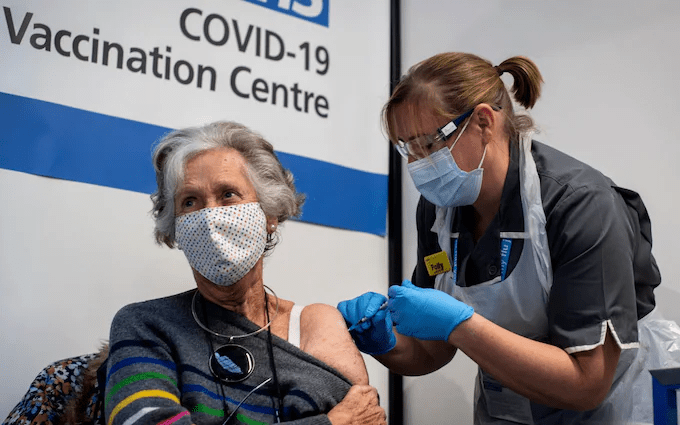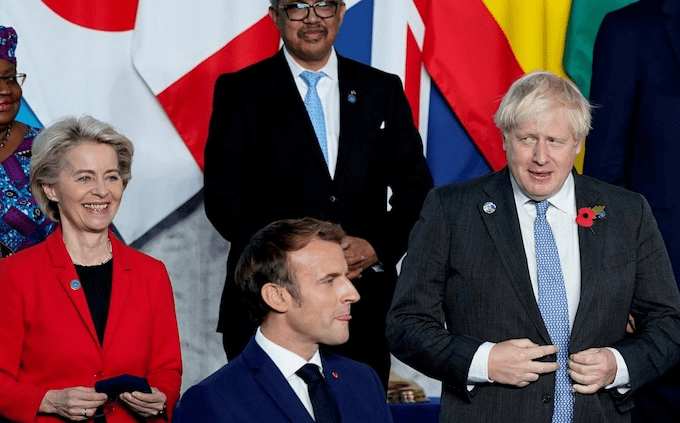Sharing of pandemic products seen as red line for many countries locked in talks
Britain is refusing to sign the World Health Organisation’s pandemic treaty while it insists the UK would have to give away a fifth of its jabs, The Telegraph understands.
The UK is firmly against such vaccine-related commitments and will not sign any form of the pandemic agreement that undermines Britain’s sovereignty.
Representatives of the WHO’s 194 member states are halfway through talks to try to agree to the WHO Pandemic Agreement, an initiative first announced in May 2021.
At the peak of the Covid emergency, nations planned to sign a legally binding document, informally known as the pandemic treaty, or pandemic accord, that would force countries to tackle the next global health emergency in a united way.
Under the terms of the latest draft of the treaty, now in its ninth and final iteration, all member states, including the UK, would be obliged to give up 20 per cent of “pandemic-related health products” to other countries and would be prevented from stockpiling supplies. This would include therapeutics, PPE and vaccines.
The WHO document states the UN-run agency would get “real-time access” to 10 per cent of these products for free, and 10 per cent “at affordable prices”.
The divisive document says countries should “set aside a portion of its total procurement of relevant diagnostics, therapeutics or vaccines in a timely manner for use in countries facing challenges… and avoid having national stockpiles of pandemic-related health products”.
A source familiar with the negotiations said: “The UK could not accept these proposals in their current form – and they have not been agreed.”

It is understood the UK will only agree to a legally binding global accord if there is a commitment that British-made jabs are used for what the UK deems to be its own national interest.
Officials are understood to want to remain in control of being able to choose when it is best for the UK to distribute products globally and when resources will be best deployed domestically.
It is understood that while the UK is keen to work towards a united approach, it is not prepared to give up autonomy on its own assets.
The sharing of healthcare items is seen as a red line for many of the countries locked in discussions over the pandemic treaty. Poorer nations see it as essential in ensuring equitable treatment for all nations but richer countries are concerned about relinquishing autonomy to a global organisation.
One key aspect of the treaty, WHO Pathogen Access and Benefits Sharing system (PLABS), has already been pushed back to 2026 as countries can not agree on how to legally enforce the distribution of virus samples and genetic information for research purposes.
Experts have cautioned that it is likely the two-week marathon talks will fail to resolve fundamental disagreements on the controversial topics and said it is likely a “vanilla treaty” will be agreed and signed by the May 10 deadline, before it is formally adopted at the World Health Assembly at the end of May.
The head of the WHO on Friday restated his hope that the vaccine impasse can be resolved as the talks entered their second week.

“Give the people of the world, the people of your countries, the people you represent, a safer future,” WHO director-general Tedros Adhanom Ghebreyesus told officials at a Geneva meeting. “I have one simple request: please, get this done, for them.”
Then former prime minister Boris Johnson announced in May 2021 that the treaty was being set up to improve alert systems, data-sharing, research, and production and distribution of medical and public health counter-measures such as vaccines, medicines, diagnostics and PPE.
He said: “The Covid-19 pandemic has been a stark and painful reminder that nobody is safe until everyone is safe.
“We are, therefore, committed to ensuring universal and equitable access to safe, efficacious and affordable vaccines, medicines and diagnostics for this and future pandemics.”
This mantra is still being echoed in the room today, sources say, but the willingness from wealthy nations to opt in to the legally binding document has seemingly diminished.
A Department of Health and Social Care spokesperson told The Telegraph: “We cannot comment on the details of specific proposals and no proposals have been agreed.
“We will only support the adoption of the accord and accept it on behalf of the UK, if it is firmly in the UK national interest and respects national sovereignty.”






